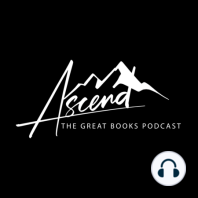67 min listen

Iliad: Book 8 | The Tide of Battle Turns
Iliad: Book 8 | The Tide of Battle Turns
ratings:
Length:
57 minutes
Released:
Feb 20, 2024
Format:
Podcast episode
Description
Deacon Harrison Garlick and Adam Minihan sit down to talk about the tide of battle turns in Book 8.In this episode we will discuss:What happens in book eight?Do the Achaeans actually need Achillies?What is the relationship between Athena and Zeus?What else should be observed in book eight?Want our whole guide to The Iliad? Download it for free.Book EightThe Tide of Battle TurnsMany attempts have been made to reconcile these two ideas, to assert the overriding power of Zeus’s will on the one hand, or that of a nameless destiny on the other. - Knox43. What happens in book eight?Zeus issues a new, “strict decree” that the gods are no longer to help the Achaeans or the Trojans in order that Zeus may “bring this violent business to an end” (8.08). The gods are in “stunned silence” when Athena acknowledges Father Zeus’ command but also provides the caveat that she’ll “simply offer the Argives tactics” (8.42). As the fighting begins anew, Zeus holds out his “sacred golden scales” of fate, and they show a “day of doom” for the Achaeans, the Greeks (8.85). Zeus makes known this judgment by letting loose his lightning and thunder against the Argives (8.89), and as they retreat, Nestor is left behind—because Prince Paris shoots his horse (8.97). Diomedes charges the front lines by himself and saves Nestor using the horses he took from Aeneas (8.116); but then he also decides to charge Troy alone in an attempt to kill Hector (8.129). Diomedes turns around, however, due to the advice of Nestor and the lightning and thunder of Zeus (8.163). Hector, bolstered by Zeus’ favor, leads Troy in an onslaught against the Argives (8.197). The goddess Hera, who is raging in Olympus, first tempts Poseidon to intervene against Zeus’ decree, but Poseidon wisely declines to fight Zeus (8.239). Hera inspires Agamemnon (8.250), the Achaean high chieftain inspires his men and cries out to Zeus for mercy (8.271). Zeus, moved by the weeping of Agamemnon (8.280), sends an eagle as an omen that the Argives may turn and fight (8.282). Zeus, however, favors the Trojans, and Hector leads an assault with eyes blazing like the war god, Ares (8.383, 398). Having failed to tempt Poseidon, Hera tempts Athena to intervene against Zeus’ decree, and Athena acquiesces and prepares for war (8.401). Zeus sends Iris, the messenger goddess, to Hera and Athena, and the two goddesses, not wanting to war with Zeus, call off their return to the battlefield (8.490). On Olympus, Zeus partially reveals his plan to Hera and Athena, the so-called “doom of Zeus” (8.551)—that there will be a battle over the body of Patroclus, friend of Achilles. Hector pushes the advance against the Greeks until nightfall, and the Trojans, the Achaeans, and the gods all wait for “Dawn to mount her glowing throne” (8.654). 44. Do the Achaeans actually need Achilles?The movement of book eight is largely structured by Zeus’ promise to Thetis—that the Trojans would prosper until King Agamemnon sees his need for Achilles (8.423). Often times, however, this is read as a self-fulfilling prophecy. In other words, that the lack of Achilles on the battlefield will inevitably lead to a Trojan advancement; yet, in contrast, it would seem that Homer presents a situation in which Zeus must bless the Trojans or the Argives will win even without Achilles. For example, examine the role of Diomedes. First, the Trojans have already stated they fear Diomedes more than they even did Achilles. Second, when Diomedes charges the Trojans to kill Hector while...
Released:
Feb 20, 2024
Format:
Podcast episode
Titles in the series (21)
Iliad: Book 2 | The Great Gathering of Armies by Ascend - The Great Books Podcast